In a similar fashion to the SAIMS conference, the 2020 edition of the IBC was postponed due to the Covid-19 pandemic. The 14th IBC returned this year as a virtual conference for the first time and was held from 20-21 September 2021. The purpose of the conference was to provide an international platform for the presentation, discussion and debate of multidisciplinary academic and professional research on contemporary developments in an ever-turbulent business environment. The conference provided the opportunity for academics, practitioners, and post-graduate students to have their work validated and benchmarked within the academic and professional community.
-
The first presentation by members of the department was given by Prof Shelley Farrington, who presented a joint research paper that was co-authored by Prof Elmarie Venter. Their paper was titled ‘Governance and success: The case of two multigenerational South African family businesses’. The aim of the paper was to explore the relationship between governance and family business success in a developing country context using a qualitative approach. Their findings confirmed that despite many family businesses not having formal governance structures in place, both formal family and business governance structures are necessary if a family business is going to survive and prosper over the long term. Several recommendations were also made on how such structures could be implemented. Their paper was nominated for the best paper award.
-
Mr Luyolo Mahlangabeza was then involved in the presentation of two research papers. The first paper was titled ‘Factors contributing to entrepreneurship development’ and was presented by co-author, Ms Siphokazi Sibara, who is an MBA graduate from the Nelson Mandela University Business School. The paper aimed to investigate the factors that contribute to entrepreneurship development in South Africa. Thereafter, Mr Mahlangabeza presented his paper titled ‘Exploring the impact of service quality on customer satisfaction: A case of Woolworths Port Elizabeth’, which was co-authored by Mrs Siyamtanda Skweyiya, who is also a Nelson Mandela University Business School MBA graduate. Their marketing research case study paper investigated service quality in the retail environment. The paper was well received and enjoyed a robust discussion among the delegates.
-
Prof Chantal Rootman’s paper was co-authored by Dr Vuyo Nyembezi and Prof Madéle Tait (Director of the School of Management Sciences) and was titled ‘The South African public broadcaster’s sustainable funding: Building a framework’. The paper was presented by Dr Nyembezi, who is a PhD (Business Management) alumnus of our department from 2018, who was supervised by Prof Tait and co-supervised by Prof Rootman. He is currently the Head of Radio and Regional Technology Operations at the SABC. Their paper sought to theoretically consider financial sustainability to develop and present a sustainable funding framework to the SABC and identify factors that could influence the SABC’s sustainable funding, and consequently lead to positive organisational outcomes. The study determined that internal stakeholders, a competitive environment and the management of resources could possibly influence the sustainable funding of the SABC. In turn, sustainable funding could possibly influence organisational outcomes positively, such as customer benefits and the organisational performance of the SABC.
-
Mr Storm Watson then presented the first of two research papers, which was co-authored by Prof Miemie Struwig and titled ‘A systematic review of research into working capital management in South Africa’. The study set out to apply a mixed methods approach to a systematic review of research into working capital management in South Africa, with the purpose of identifying research gaps in the current body of knowledge by developing a recommendation’s framework. Thirty academic outputs between 2010 and 2020 were included in the sample to be analysed. The review found that there were various untapped avenues of research relating to working capital management, specifically research methodology, data analysis, data collection and types of research outputs. These untapped avenues of research into working capital management should be addressed by future researchers to broaden the body of knowledge in the field of working capital management.
-
Mr Watson then presented his second paper, this time co-authored by Prof Elroy Smith and titled ‘Perceptions of consumers regarding the use of water-saving devices and products’. Their paper set out to investigate the perceptions of consumers regarding the use of water-saving devices and products in Nelson Mandela Bay, South Africa. With many local cities currently faced with water shortages and implementing water restrictions, it is necessary for consumers to make a shift in their mind-set and consumption. The main findings of the study indicated that consumer education on the water crises and water-saving strategies are critical and that consumers should have a mind-shift in terms of water consumption and the use of water-saving devices and products. Useful guidelines are provided to households and local municipalities regarding the use of water-saving devises and products.
-
Finally, Prof Elroy Smith and Emeritus Prof Noxolo Mazibuko co-authored a paper with a past PhD student of theirs and a subsequent alumnus of the department, Dr Siya Xolo. Their paper was titled ‘The impact of demographics on the implementation of farmworker equity share schemes in South Africa’ and it aimed to assess the impact of demographics on the implementation of farmworker equity share schemes in South Africa. These schemes are part of the government’s land redistribution programme, designed to equip and empower farmworkers. The schemes started in the early 1990s and involve a special arrangement between the farmer and farmworkers. A total of 49 directional hypotheses were formulated to investigate the impact of seven independent demographical variables on seven dependent variables (factors impacting implementation of farmworker equity share schemes). The empirical results showed that 20 statistically significant relationships exist between these variables. Practical guidelines regarding the impact of demographics on the effective functioning of farmworker equity share schemes are provided.
Well done to all members for their research contributions to the field of management sciences. We look forward to your future research outputs!
